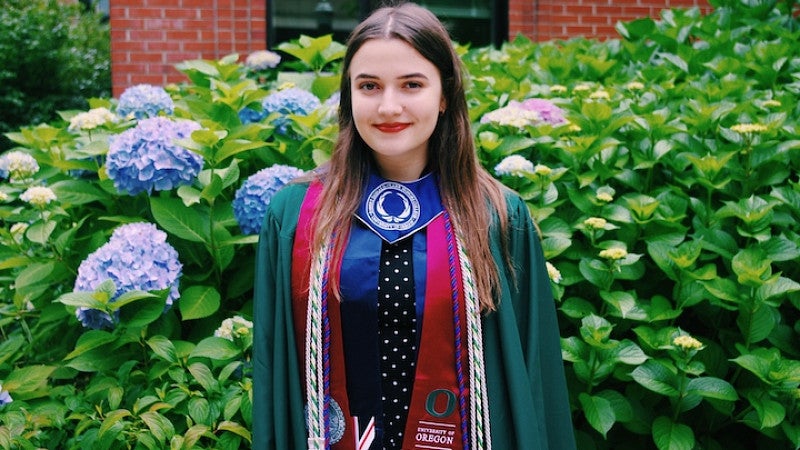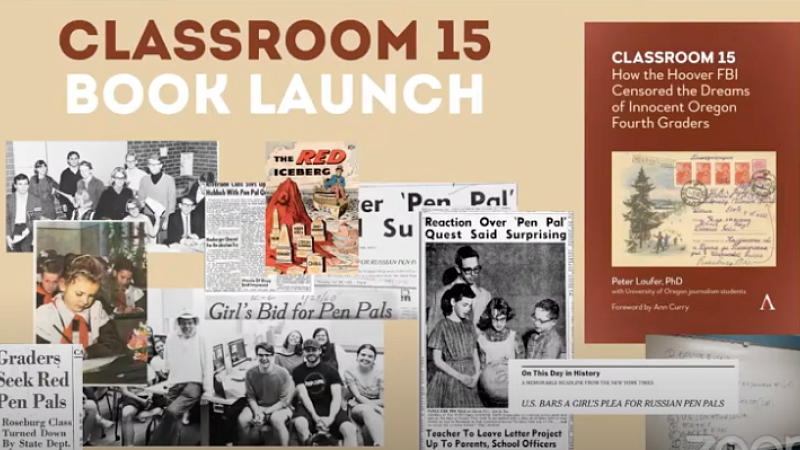
Julia Mueller
Story by Julia Mueller, CHC alumna
Photo courtesy of Julia Mueller
It was a cold January morning in Allen Hall, and a book was about to be written.
Of course, it wasn’t a book from the beginning. But the story started that morning, when School of Journalism and Communication Professor Peter Laufer traipsed into his Reporting II classroom, waving a copy of the New York Times “On This Day” column. He read aloud an excerpt from the archives: 60 years earlier, the Eisenhower/Hoover federal government stanched the efforts of a fourth-grade class to strike up a pen pal exchange with the Soviet Union. The dateline referenced Roseburg, Oregon—a small timber town in Douglas County, just an hour from Eugene.
The reporting students set themselves to the task of finding the fourth-grade class secretary mentioned in the piece. After a few false starts and phone calls that spread from Roseburg to the East Coast, the class found Janice, now approaching 70, on the other end of the line in the suburbs outside of Las Vegas.
The reporting class latched onto the colorful anecdotes Janice recalled of that ephemeral moment in her youth and dispatched themselves to research the story from different angles. Some looked into the 1960s State Department while others tracked down the teacher behind the pen-pal project.
It was still not yet a book.
It was spring term of my junior year, and I had a lot in the works: I was brainstorming the beginnings of my Clark Honors College thesis, had started work as a copyeditor for The Emerald and as a writing coach at the SOJC’s Writing Central, and had just been elected president of the Forensic Department’s Mock Trial program. But when I was approached with this new project by Professor Laufer— who had just signed on to be my primary thesis advisor— I added it eagerly to my docket.

CHC alumna Julia Mueller and co-authors explain the process of writing Classroom 15.
Like the project itself, my role started small. I was called in to copy-edit a handful of disjointed articles written by individual students for their finals-week assignment, each exploring a different aspect of the 1960s pen pal effort. We weren’t sure, then, whether the stories would fit best as one-off pieces in a local paper, or whether they would hold up in a longer format—but we knew that there was more to be explored.
As Professor Laufer and I talked over my edits and discussed the narrative arc that lay dormant in the drafts, my role developed into that of managing editor. I started work on mapping out the lines of inquiry the authors could continue pursuing to push the scope of our short articles into something bigger. I brainstormed rewrites and new interviews, scheduled visits to Roseburg and the UO archives, and sketched out a plan for pitching to publishers.
Professor Laufer and I would often meet in Allen Hall to discuss my thesis in one breath and the book in the next. I pulled him aside in the spring of 2019 and suggested that a piece of the story was missing—and he suggested I write it. I added a chapter of my own to the manuscript-in-progress and we realized: We were writing a book.
In the two years of reporting and editing that followed, the nine co-authors traveled throughout the West, drawing on sources as diverse as the FBI and the teacher who proposed the pen pal project in the face of opposition fueled by Red Scare fear, the State Department and the Douglas County archives.
"...the scope of the book is much bigger. It draws throughlines from
the Cold War to our contemporary sociopolitics. And it reveals,
through the close examination of one specific historical instance,
the paranoia that has plagued the American ethos
and snaked down from the marble halls of government
to the timber mills of small towns like Roseburg."
We followed the story from its start in the classroom to its features in the New York Times and the Russian paper PRAVDA. We found postcards from beyond the Iron Curtain, delivered to the school district but never shown to the Roseburg students—tucked away, instead, in the teacher’s cedar chest until the UO reporting class came knocking.
To bring the story full-circle, our lead author traveled to Russia, carrying letters written by modern-day Oregon fourth-graders to connect Oregon’s Classroom 15 with Gymnasium 14 in Rostov-on-Don, finally, these sixty years later. In my managing editor role, I assigned him to write two new chapters on his flight home so we could send them off to a potential publisher the next day—just one of many examples of the endless student dedication and the significant collaborative effort that poured into this project.
And we were, of course, students as well as journalists, conducting interviews in-between classes and working on our chapters alongside school assignments.
One author turned her sorority’s spring break trip into a reporting deep dive to talk to Janice in Las Vegas; I sent out research assignments for the team from my summer vacation in Hawaii. We’d congregate at Writing Central, where another co-author and I both worked, to talk over edits. I’d work with our lead author, a Mock Trial vice president, on manuscript-pitching logistics while we were out-of-town for competitions.
We secured the Classroom 15 publishing contract in the week of graduation in 2020, just a few days after my thesis defense, and the book that began in Allen Hall in January 2019 was published in January 2021 by Anthem Press. Classroom 15: How the Hoover FBI Censored the Dreams of Innocent Oregon Fourth Graders explores borders, international communication, governmental overreach, propaganda, and fear.
The central story is a small one: a young girl, a small classroom, a small town, and a fleeting Warholian fifteen minutes in the national spotlight. But the scope of the book is much bigger. It draws throughlines from the Cold War to our contemporary sociopolitics. And it reveals, through the close examination of one specific historical instance, the paranoia that has plagued the American ethos and snaked down from the marble halls of government to the timber mills of small towns like Roseburg.
And in tandem with Janice’s story is a meta narrative. It’s the story of the nine student journalists as they researched and wrote, traveled abroad, graduated, and—after all, in spite of myriad setbacks, alongside senior-year schoolwork and new-grad job searches, amidst a pandemic—wrote a book.
The scrapbook reporting style of Classroom 15 highlights not only the intricacies of the 1960s pen pal project, but also the complexities of collaborative journalism—and the potential for a story to look inward on itself, examine the very industry in which it’s told, and become richer for it.
--
Julia Mueller, BA ‘20 (Journalism, Clark Honors College), was the managing editor and a co-author of Classroom 15. She worked on Classroom 15 alongside her Clark Honors College thesis, which received the Interdisciplinary Thesis Award. She graduated magna cum laude with the SOJC’s award for Academic Excellence in Journalism, and was named one of 2020’s Phi Beta Kappa Oregon Six. This fall, she’ll attend the Medill School of Journalism at Northwestern University as a member of its DC-based Politics, Policy and Foreign Affairs specialization.
